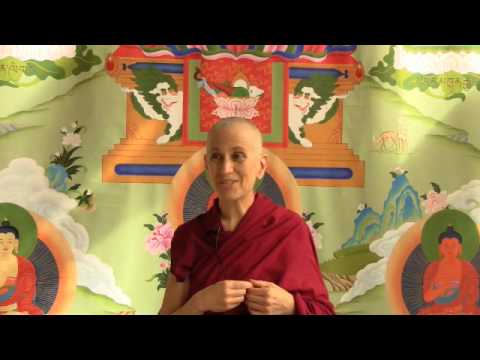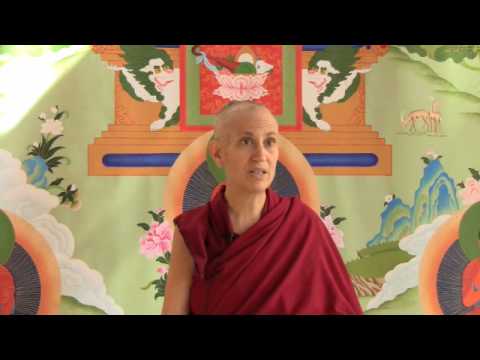Self-generation and emptiness
Part of a series of Bodhisattva's Breakfast Corner talks given during the Green Tara Winter Retreat from December 2009 to March 2010.
- In a successful meditation on emptiness, the appearance of the conventional I ceases
- Doing the four-point analysis, getting a feel for emptiness
Green Tara Retreat 065: Self-generation and emptiness meditation (download)
There are a few questions that have been on my question sheet for many weeks which I haven’t gotten around to and I am getting around to some of them now.
This person is asking about the self-generation and saying, “First, we eliminate the false view of the inherent existent self.” There’s some confusion about how to generate as the deity after that because this person is thinking that we eliminate the view of the inherently existent self, but then we have the conventional self that remains.
On a conventional level, yes, the mere I remains. But when you are meditating on emptiness, when emptiness appears to your mind directly, and here we are only pretending to imagine what this is like—at least I am as I can’t speak for you. When the meditation on emptiness happens, when you are successful, even the appearance of the conventional I ceases at that time. The conventional I still exists, but because it’s a wisdom that knows the ultimate nature, it’s not perceiving any conventional objects at that time. It’s not that your inherently existent I dissolves and you still perceive your conventional I at that time; that is not going to work because to ordinary beings any conventional object that appears to the mind appears truly existent.
If you are really getting into emptiness, you are not going to even have the appearance of the conventional object. Even if we are pretending to do this in our meditation at that point, you think that only emptiness appears to the mind. Then, when you lose your concentration on that, you start the process of the self-generation in which you imagine that your wisdom that realizes emptiness appears in the form of the deity.
This person is also wondering, “Does the merely labeled I carry this wisdom over?”
The merely labeled, I don’t know. I can’t grasp how this is being thought of, that process at that time. The wisdom is there, you could label the conventional I on the basis of the wisdom, but you don’t think, “Here’s the conventional I, and here’s the wisdom, and it’s chugging along together,” because that’s inherent existence, isn’t it?
And then, “Is that wisdom actually part of the aggregates in dependence upon which the conventional I is designated?”
Yes, because the fourth aggregate, conditioning factors, that includes all the different mental factors.
Audience: So, those are my questions; because we don’t realize emptiness and everything doesn’t disappear, at least for me, nothing is personal, what do we do for now, I mean we’re just…
Venerable Thubten Chodron (VTC): So what do we do, because…
Audience: it’s not all gone.
VTC: Because we don’t have the realization of emptiness and the closest we come to it is “I have a feel for emptiness.” What you do is you try and do the four-point analysis. Then you just get to whatever feeling you get to, maybe there’s a feeling that the I isn’t quite so solid, maybe you just imagine clear open space, or you contemplate what it would be like to perceive something without thinking of it as having its own essence, or holding it as having its own essence. It is just some kind of contemplation along that line of emptiness we can do at the present. At the same time we can learn more about what emptiness is and how to do the meditation, and then continue to practice that meditation.
I remember Lama Zopa, when we’d be doing these meditations, and Rinpoche would come (and say), “Okay, feel infinite bliss and emptiness.” And Rinpoche is right there in the middle of bliss and emptiness. And I’m like, “Huh? I don’t know what emptiness is and I really don’t know what bliss is either.” Imagine what great bliss feels like.
Venerable Thubten Chodron
Venerable Chodron emphasizes the practical application of Buddha’s teachings in our daily lives and is especially skilled at explaining them in ways easily understood and practiced by Westerners. She is well known for her warm, humorous, and lucid teachings. She was ordained as a Buddhist nun in 1977 by Kyabje Ling Rinpoche in Dharamsala, India, and in 1986 she received bhikshuni (full) ordination in Taiwan. Read her full bio.


